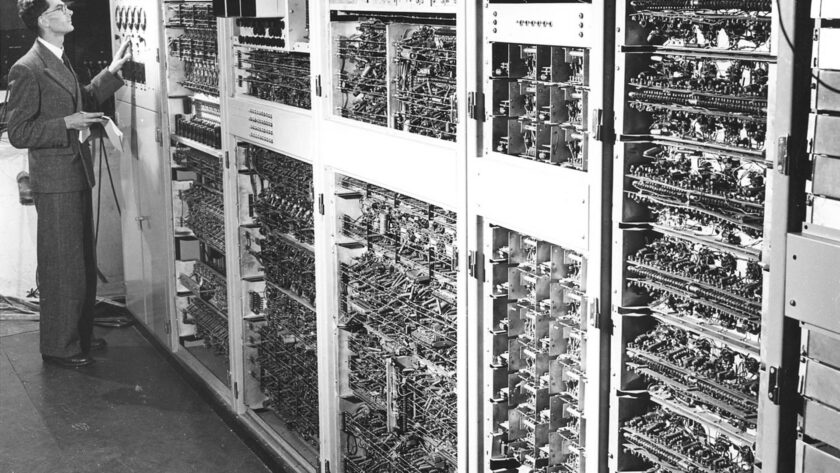The Past
According to Julianne Nyhan and Andrew Flinn, in Computation and the Humanities: Towards an Oral History of Digital Humanities, using digital tools to perform history tasks was first done in 1949 by Busa and IBM, who worked on making an index of medieval latin words. The main focus of digital humanities from the beginning was text-based because that was about all that could be done. There wasn’t necessarily an official name for humanities work on the computer, people were just figuring out what they could do, but they were certainly thinking about how digital technology could help move the field forward.
The Present
The main focus of DH is probably still text but with more tools available to analyze it and manipulate it. This would include things like distance reading, language processing and other text-based tools. More digital tools are developing to make it easier to analyze non-text elements like locations (maps) and image characteristics. Of course, large scale data analytics on a variety of subjects can give insight into major trends and developments.
These digital tools are driving the wedge between historians and the digital space since most historians do not have the technical expertise to use them. The result is the need for collaboration between historians and digital experts. DH is evolving at present because it is relatively new title. Therefore, the tools and methodologies used in DH need to be transparent so it gains trust and aids in understanding of how results are created. There are many other considerations with the present state of DH — is it a discipline of its own and how does it fit into the broader fields of history and humanities? Even if we can’t answer those questions right now, there is no question that DH is providing insights and knowledge that could not be done by one person using traditional methods.
The Future
I think that in the future DH will carve out its space in the field as distinct sub-field, at least. Technology is a forward-moving juggernaut and you can’t stop it. The advantages of using digital tools to do history are going to make sure it continues to happen and continues to get better. That doesn’t mean traditional methods of history and humanities will go away, at all, but the digital historian will fulfill an essential role in the process of understanding history. Will a DH work alone? Probably a lot, but as with any field, there will be collaboration between the DH and anyone who needs assistance with those special skills the DH has. And I do think they are special skills, since as we have learned in this class, there is some deep thought about issues in a digital-specific way relating to digital ethics, digital methods, biases, technical skills and more. In the far future, most likely all historians will be digital historians but they will have merged into the ‘super-historian’.
I have really enjoyed this class and I hope there will be more digital history classes in the future. I thank all my classmates and Dr. Otis for being so creative and inquisitive, and helping to broaden my history thinking.
Julianne Nyhan and Andrew Flinn, “Introduction,” in Computation and the Humanities: Towards an Oral History of Digital Humanities (Springer, 2016), 1-19.





Awesome post, I really liked how you laid it out. Great picture. DH has come a long way, and I agree with your point that it needing to be more transparent. I wonder as you said, if all historians will become digital historians, if Digital History will become something of its own thing and their will be historians and digital historians or if there will only be historians still in name but in essence as you put it super historians. integration-Fragmentation- integration.
Ooh, this idea of the super-historian is wild. It’s funny because I never thought I could be a historian — I just thought I wasn’t smart enough or only rich people did that. Like, how would you even start?! I would watch sooo many documentaries about random topics and I’d be so perplexed by younger (like under-50s) people showing up and talking about a topic — I wanted to be like them!!! And now, I am still unsure if I could be called a historian though outside of this class, I teach 2 different history-adjacent classes. At what point do we decide we’re historians, lol?! But the idea of the super-historian, the jack of all trades, does seem like the eventual implication right? I sort of go back to my question of, like, will there ever be the historian that never uses digital tools? Does that even exist now?
Hope you have a great end to your year!
Having the distinction that digital history will not replace traditional history is a very important one to make! While the advancement of the digital humanities has helped usher in fascinating research in the past few decades, much more progress can be made with both realms of practice working alongside one another!
Hi Julia. I really loved how you organized your post in a triad: past, present and future. Also thanks for the comments and interesting questions you posted in my blog. I am going to address them here, since they relate with what the points you make in your blog. As you said, I think that the digital historian will have a crucial role in the process of understanding and creating historical knowledge. This might create a power and wage gap between coding historians and non-coding historians. The wage structure of the field will get hollowed out in the middle: programming historians will dominate the field, and the humanities workers that don’t wield those skills will be confined to poorly paid routine tasks. It might also be the case that history will become a sub-field of a specialization of computer science. What I say sounds a bit depressing. However, I think you are right; maybe better tools will be handed to historians and coding won’t be a great deal of gatekeeping.
Great post. I particularly enjoyed the portion on the future of digital humanities. We can certainly speculate what will happen in but it is hard to be certain of the future of DH. I agree that the skills and tools will be essential in the progression of the humanities but that the “old ways” will never fully go away.
I believe the question of whether or not digital history will replace traditional history is a complex one. I’m of the opinion that the lines between the two are more likely to blur rather than remain two distinct methods of practicing history. I also believe that DH should be incorporated more into “traditional” history courses. I don’t remember how many “read a book each week, write 2 book reviews and a final” history classes I’ve taken and in terms of content retention, I’ll remember what I learned in this class far longer than what I learned in those.
I really enjoyed how you set up this post. Breaking up the development (both past and ongoing) of DH really drives home the combination of newness and amorphousness of the whole thing. I agree that collaboration is the heart and soul of DH and that history as a major field could only benefit from heading further in that direction. Like you said, development of technology isn’t going to be stopping anytime soon, and DH can only follow the same trajectory!